Sleep is a natural necessity like food, water and shelter. And going without sleep for extended periods of time can be dangerous for your health.
Everyone wants to get a proper amount of sleep. In fact, research shows that in order to stay at optimum health, a full grown adult should get seven to nine hours of sleep per day. While this is commonly understood, according to an article by the Center for Disease Control about 30% of people in the US are not getting enough sleep.
There are many culprits that can rob you of your sleep, not the least of which are health concerns like sleep apnea and insomnia. However, most people suffer from a lack of sleep because of distractions and burning the candle at both ends. Sleeplessness can result in serious health concerns over time, including lowered immune health, increased blood pressure, weight gain, and of course general lack of focus from exhaustion.
Sleep Hygiene: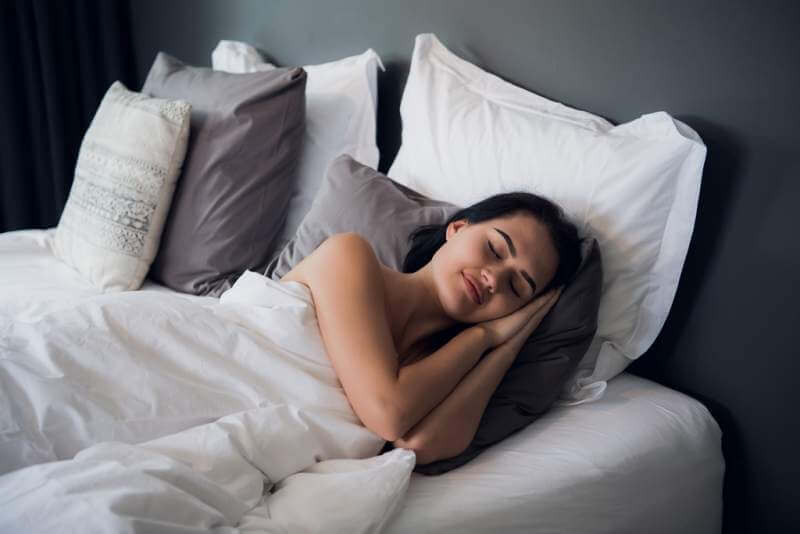 While quantity of sleep is an important factor there are also qualifications on sleep that make it less or more restful. Practicing what is called good sleep hygiene will allow you to have more restful sleep patterns.
While quantity of sleep is an important factor there are also qualifications on sleep that make it less or more restful. Practicing what is called good sleep hygiene will allow you to have more restful sleep patterns.
There are a number of natural ways to add to the quality of your sleep.
Some of these involve things you should avoid if you have any sleep issue, such as:
- Do not drink caffeine after noon
- Do not watch screens before bed
- Do not exercise within 3 hours of bedtime
- Do not nap too much during the day
However, one of the major elements that can add to your positive rest potential resides in how you craft your sleep environment.
Elements of this are obvious — your sleep environment wants to be quiet and dark and wants the bedding to be comfortable, but one aspect that you may not consider that has a significant effect on your sleep is smell.
The sense of smell is powerful, with olfactory receptors said to be a thousand times more useful for identifying than taste buds. Aromas can evoke memories and directly affect neural pathways. Therefore, the aeromatic landscape you create is hugely useful for enhancing sleep. There are a number of soporifics found in natural scents that if used before or during sleep can allow you to wake refreshed and with more energy for the following day.
The scents of certain plants are shown to have different qualities, so if you are having sleep issues you can test which of are most effective for you as an individual.
Here we’ve outlined 15 scents that are shown to help sleep quality. If you have a green thumb, you may be able to grow some of these plants, but you can also use a small amount of a store bought fragrance that contains the desired scent to create your best bedtime smellscape.
1. Lavender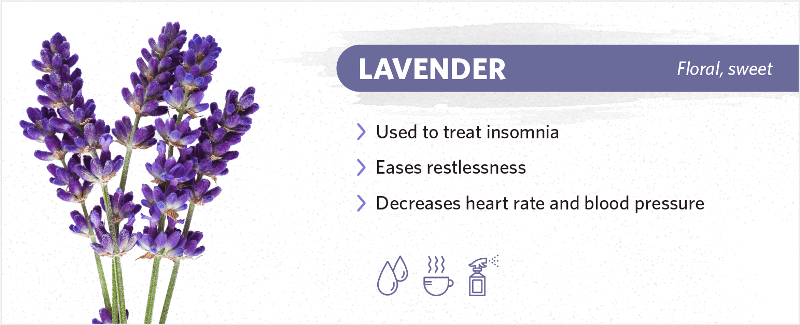 Research on lavender has conclusively shown that the smell naturally combats insomnia and sleeplessness. In one medical study, those smelling lavender experienced a reduction of blood pressure and heart rate and a lower stress level. There is speculation that has been supported by study that lavender actually alters brainwave patterns toward a healthier night of sleep.
Research on lavender has conclusively shown that the smell naturally combats insomnia and sleeplessness. In one medical study, those smelling lavender experienced a reduction of blood pressure and heart rate and a lower stress level. There is speculation that has been supported by study that lavender actually alters brainwave patterns toward a healthier night of sleep.
It’s possible to obtain lavender oil and place just a small amount on your pillow to achieve a positive effect.
2. Vanilla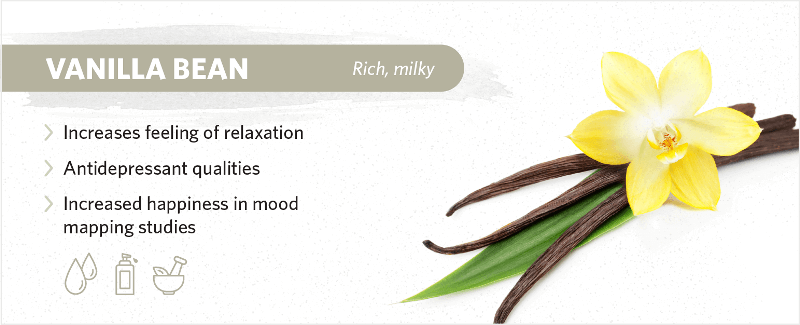 The smell and taste of vanilla is linked with more than just lovely memories of holiday cookies. A natural antioxidant, vanilla links with hormones in the body that react to the scent and create mood elevation and act as a soporific for a relaxing sleep.
The smell and taste of vanilla is linked with more than just lovely memories of holiday cookies. A natural antioxidant, vanilla links with hormones in the body that react to the scent and create mood elevation and act as a soporific for a relaxing sleep.
3. Valerian Extract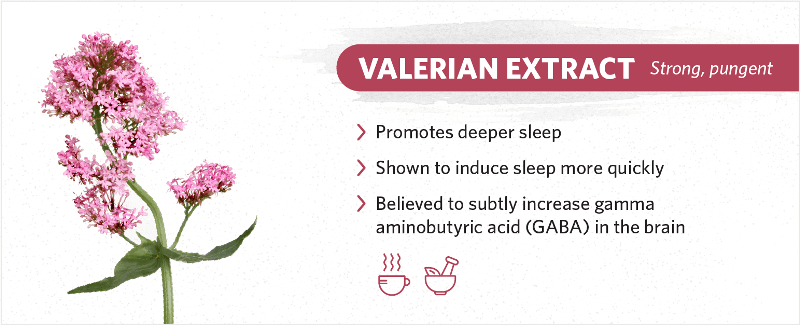 While some people ingest valerian drops to help them get a restful sleep, the aromatic nature is also effective for this purpose. Research has shown that the smell causes a rise in the delta and theta activity that controls sleep in the brain. The effect is deeper and more restful sleep.
While some people ingest valerian drops to help them get a restful sleep, the aromatic nature is also effective for this purpose. Research has shown that the smell causes a rise in the delta and theta activity that controls sleep in the brain. The effect is deeper and more restful sleep.
4. Sandalwood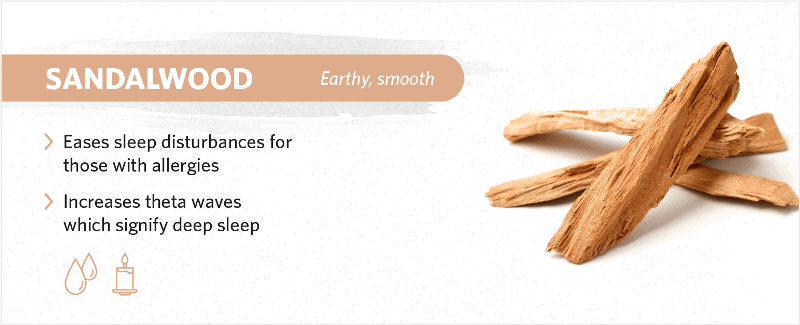 Gleaned from of the most expensive trees in the world, the long lasting and calming smell of sandalwood has made it highly coveted for hundreds of years. The earthy aroma may also contribute to related theta activity in the brain. In addition, the essential oils of sandalwood can be effective in treating allergies. Unless, you are allergic to sandalwood, that is.
Gleaned from of the most expensive trees in the world, the long lasting and calming smell of sandalwood has made it highly coveted for hundreds of years. The earthy aroma may also contribute to related theta activity in the brain. In addition, the essential oils of sandalwood can be effective in treating allergies. Unless, you are allergic to sandalwood, that is.
5. Juniper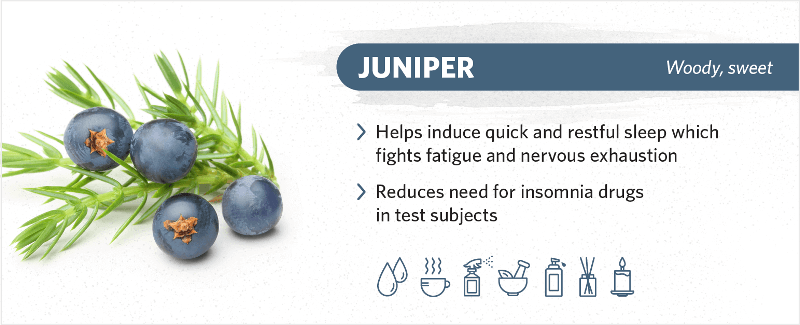 Berries from a Juniper tree have been used throughout history to create medicines and may effective in fighting viruses and bacteria. However, it is also shown to combat restlessness and was even featured in a study that allowed people to substitute juniper for some small dosages of sleep aid medication. Another effect of juniper is to clear out bronchial pathways, aiding in deeper breaths and better sleep.
Berries from a Juniper tree have been used throughout history to create medicines and may effective in fighting viruses and bacteria. However, it is also shown to combat restlessness and was even featured in a study that allowed people to substitute juniper for some small dosages of sleep aid medication. Another effect of juniper is to clear out bronchial pathways, aiding in deeper breaths and better sleep.
6. Lemon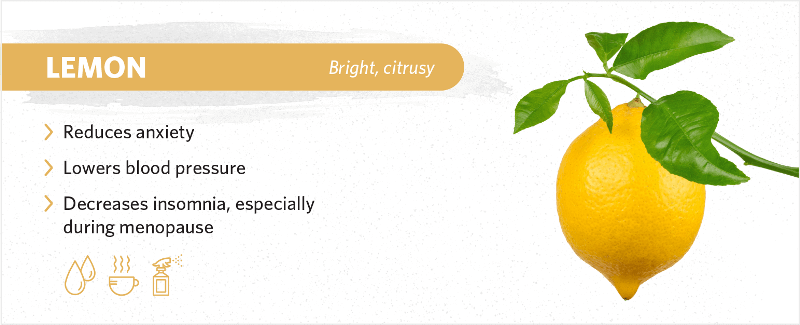 A fresh lemon scent has often been used to cover up unpleasant odors in the home and replace them with a calming and zesty citrus air. You might think that this would have the effect of awakening the senses, but the smell of lemon has been shown to lower stress and blood pressure levels, allowing the body to rest.
A fresh lemon scent has often been used to cover up unpleasant odors in the home and replace them with a calming and zesty citrus air. You might think that this would have the effect of awakening the senses, but the smell of lemon has been shown to lower stress and blood pressure levels, allowing the body to rest.
7. Bergamot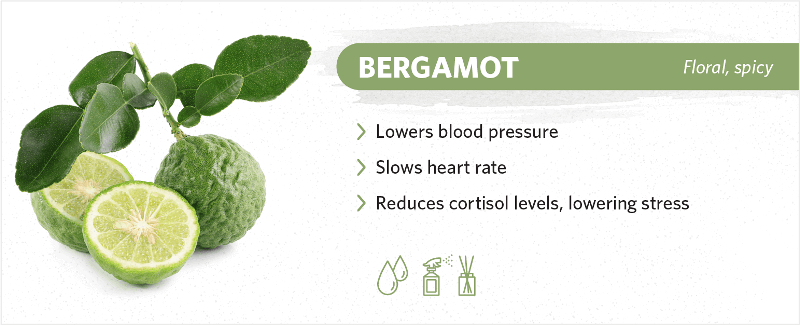 Bergamot is a citrus fruit that hails from southern Italy. The scent is enhanced by taking an essential oil from the peel. Those who live in Calabria say that the plant has many medicinal properties. Research shows that stress and blood pressure issues may be alleviated by Bergamot.
Bergamot is a citrus fruit that hails from southern Italy. The scent is enhanced by taking an essential oil from the peel. Those who live in Calabria say that the plant has many medicinal properties. Research shows that stress and blood pressure issues may be alleviated by Bergamot.
8. Frankincense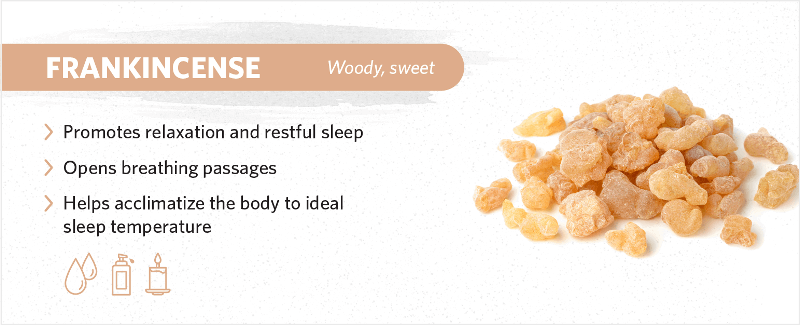 Recognizable from the story of the three magi, the fragrant smell of the resin from certain African trees has long been used to create a pleasant smelling environment. Studies show that Frankincense can help reduce allergy symptoms and lead to positive sleep outcomes. It’s even used in medical capacities for improving patient sleep patterns.
Recognizable from the story of the three magi, the fragrant smell of the resin from certain African trees has long been used to create a pleasant smelling environment. Studies show that Frankincense can help reduce allergy symptoms and lead to positive sleep outcomes. It’s even used in medical capacities for improving patient sleep patterns.
9. Ravensara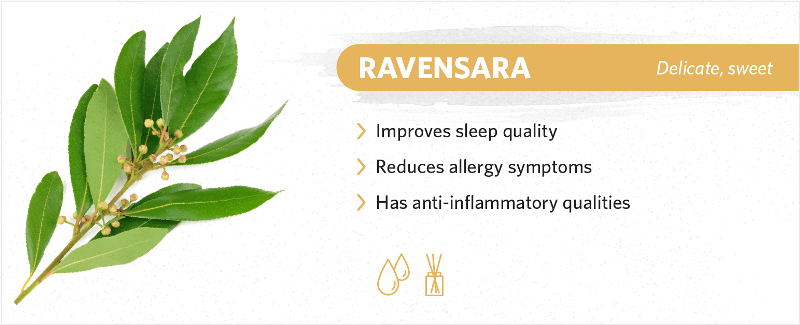 It has been determined that odors of Ravensara leaves, which is a tree that grows mainly in Madagascar, can help lower inflammation and congestion, leading to improved sleep. Research demonstrates that it is a natural antibacterial agent and fights fungal infection and reduces stress.
It has been determined that odors of Ravensara leaves, which is a tree that grows mainly in Madagascar, can help lower inflammation and congestion, leading to improved sleep. Research demonstrates that it is a natural antibacterial agent and fights fungal infection and reduces stress.
10. Marjoram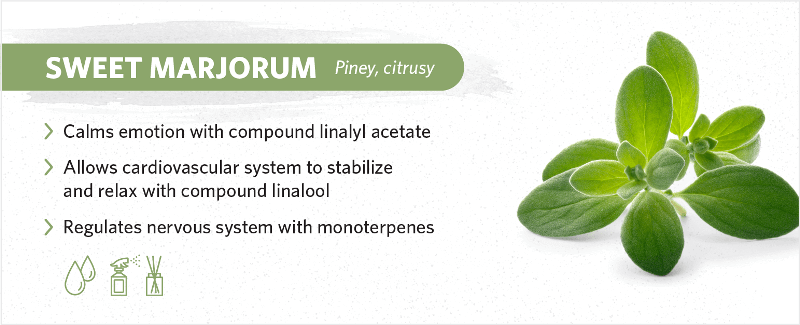 Those who know this scent from their spice cabinet might be surprised to learn that the herb is a known sleep aid. Elements within the plant include linalool and linalyl acetate which when inhaled can improve cardiovascular health and promote rest. A study of marjoram oil on the sleep habits of nurses who worked night shifts demonstrated a positive result for its use.
Those who know this scent from their spice cabinet might be surprised to learn that the herb is a known sleep aid. Elements within the plant include linalool and linalyl acetate which when inhaled can improve cardiovascular health and promote rest. A study of marjoram oil on the sleep habits of nurses who worked night shifts demonstrated a positive result for its use.
11. Roman Chamomile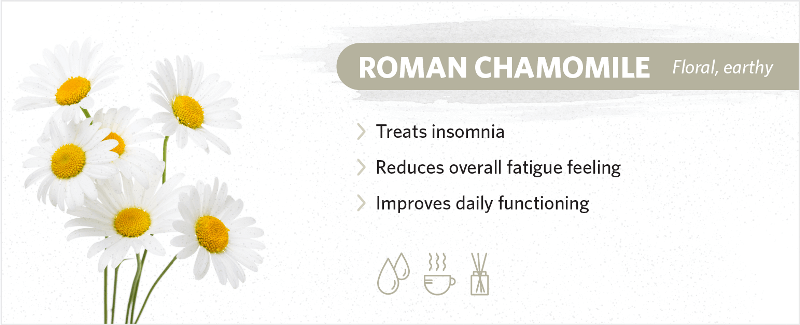 Since Roman times, this sleep agent was well-known to create a sense of tranquility. While many people drink the tea to promote calming and rest, the scent from an essential oil can be even more effective. A study demonstrates the potential of Roman Chamomile to also contributed to improved daytime activity levels.
Since Roman times, this sleep agent was well-known to create a sense of tranquility. While many people drink the tea to promote calming and rest, the scent from an essential oil can be even more effective. A study demonstrates the potential of Roman Chamomile to also contributed to improved daytime activity levels.
12. Geranium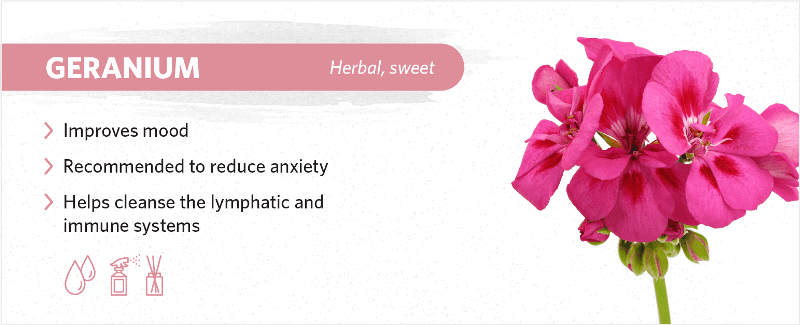 This popular garden flower can also be useful in lulling you into a quality sleep pattern. Known to elevate your mood and relieve stress, it has even been used in clinical settings to calm those in emotional distress. Other studies have shown that the flower can have the effect of bolstering the immune system.
This popular garden flower can also be useful in lulling you into a quality sleep pattern. Known to elevate your mood and relieve stress, it has even been used in clinical settings to calm those in emotional distress. Other studies have shown that the flower can have the effect of bolstering the immune system.
13. Rose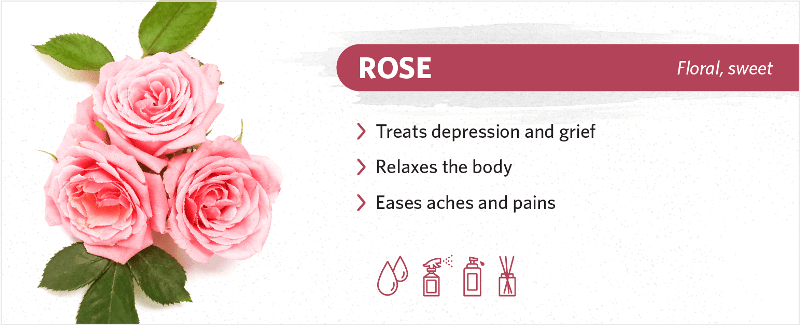 Someone delivering you roses is getting you more than just a beautiful flower. Essential oil made from roses has been used for everything from alleviating stress to cough remedy to helping with chest pain. Using rose water or oil can reduce inflammation and help provide a quality nights sleep.
Someone delivering you roses is getting you more than just a beautiful flower. Essential oil made from roses has been used for everything from alleviating stress to cough remedy to helping with chest pain. Using rose water or oil can reduce inflammation and help provide a quality nights sleep.
14. Ylang Ylang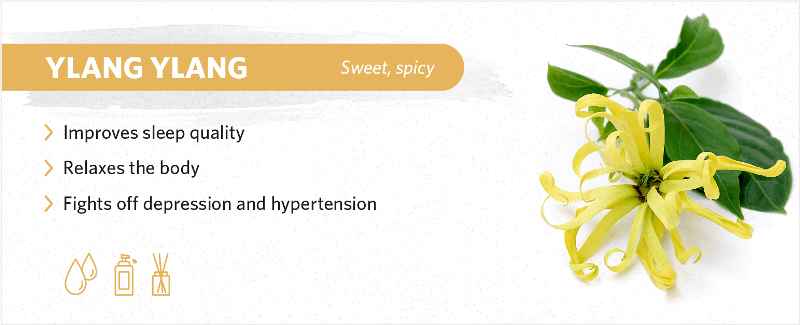 Known extensively in Thailand as a folk remedy for insomnia, a recent study on the sleep habits of college students determined that there was some scientific backing to this. Research also indicated that Ylang Ylang can be used to improve self esteem and lower anxiety.
Known extensively in Thailand as a folk remedy for insomnia, a recent study on the sleep habits of college students determined that there was some scientific backing to this. Research also indicated that Ylang Ylang can be used to improve self esteem and lower anxiety.
15. Jasmine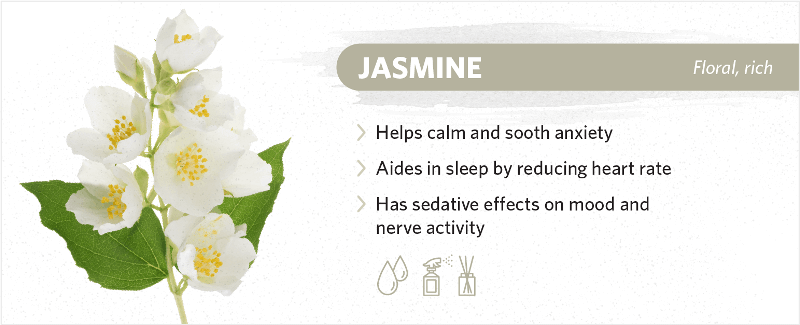 The chemical properties of Jasmine have been demonstrated to act similarly to anaesthetics like propofol giving it the same qualities that are found in popular sleep medications like valium. In a study on mice, the aroma was shown to be an excellent soporific, relieving stress and creating improved sleep patterns.
The chemical properties of Jasmine have been demonstrated to act similarly to anaesthetics like propofol giving it the same qualities that are found in popular sleep medications like valium. In a study on mice, the aroma was shown to be an excellent soporific, relieving stress and creating improved sleep patterns.
Prescription sleeping medications are a cottage industry, but the side effects of these can be harsh. It’s often difficult to figure out dosage and the wrong dose can knock you out for a day. These natural alternatives are a low cost investment and something you might want to try before going to see a doctor for help.
So when turning out the lights, making sure your pillows are fluffed and everything is quiet, consider adding scent to your arsenal of sleep aids. Diffusing some in the air or spraying a little on your pillow or sheets will give you the effect you want to lay your weary head down for quality rest.

Infographic Source: https://www.fragrancex.com/fragrance-information/scents-to-help-you-sleep
Share this post if you like it!
